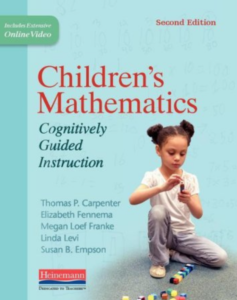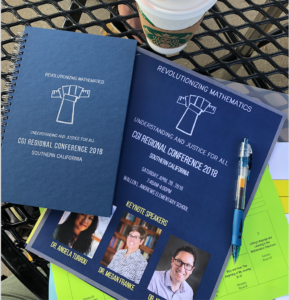is it okay if I…
At the CGI Regional Conference 2018, hosted by the UCLA Math Project, Dr. Angela Turrou and Dr. Nick Johnson gave a keynote where they shared a frequently asked question from teachers in their staff development work: “Is it okay if I…?” As educators, both of us have experienced very similar wonderings as our colleagues have asked- Is it okay if I do the same problem type several days in a row? Is it okay if I walk away now? Is it okay if I don’t spend that much time unpacking the problem?
In true CGI fashion, Nick and Angela’s response to, “Is it okay if I…” was to pose questions to us in return. And, it wasn’t, “What do you think?” 🙂 Instead, they posed the three questions below as guides for reflection around mathematical instruction:
- How does it create space for me to learn about children’s mathematical thinking?
- How does it position students competently?
- How does it provide opportunities for children to build upon their mathematical ideas?
All three questions have a common presumption: children come to us with mathematical knowledge that we can build upon. The questions are truly student centered.
 In Children’s Mathematics: Cognitively Guided Instruction by T. Carpenter, E. Fennema, M. Franke, L. Levi, and S. Empson, it states, “Children enter school with a great deal of informal or intuitive knowledge of mathematics that can serve as the basis for developing understanding of the mathematics of the primary school curriculum. Without direct instruction on specific number facts, algorithms, or procedures, children can construct viable solutions to a variety of problems.” (Pg. 4)
In Children’s Mathematics: Cognitively Guided Instruction by T. Carpenter, E. Fennema, M. Franke, L. Levi, and S. Empson, it states, “Children enter school with a great deal of informal or intuitive knowledge of mathematics that can serve as the basis for developing understanding of the mathematics of the primary school curriculum. Without direct instruction on specific number facts, algorithms, or procedures, children can construct viable solutions to a variety of problems.” (Pg. 4)
So what does this and those three questions mean to us?
Michelle: When I really sat with these questions so much surfaced for me. They encompass so many of my ideas and experiences, but not because I just knew the answers or they came easy to me. I began to reflect about the questions more than what they gave at face value. There was depth. Thinking about my own implementation of math instruction- it is such a process! I’ve gone through experiences in engaging with students as they problem solve, working with teachers as they start their journey in the teaching of CGI, and so much reading/studying over the course of several years. Those few questions are able to wrap up so much for me that I can’t imagine not spending some time with them.
Angela: I think these questions are exactly what the study of CGI is all about. The study of CGI is generative. These three questions allow me to add to my existing learning and in turn form new learning about the work. They can help when I’m doubting myself as I sit next to a student, wondering what question to ask next. I feel like the questions will start making me self-reliant and build my confidence in the work I do side-by-side with students.
These three questions really impacted us. So, the next time we are thinking, “Is it okay if I…” we know we can turn to ourselves and our students for the answer.

What do you think of these questions? Please share your thoughts in the “comments” section. We look forward to hearing from you!
Cheers!
Your partners in possibility,
Angela and Michelle
